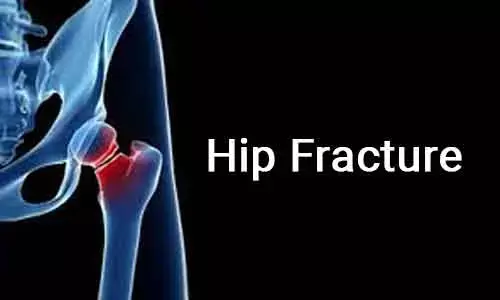- Home
- Medical news & Guidelines
- Anesthesiology
- Cardiology and CTVS
- Critical Care
- Dentistry
- Dermatology
- Diabetes and Endocrinology
- ENT
- Gastroenterology
- Medicine
- Nephrology
- Neurology
- Obstretics-Gynaecology
- Oncology
- Ophthalmology
- Orthopaedics
- Pediatrics-Neonatology
- Psychiatry
- Pulmonology
- Radiology
- Surgery
- Urology
- Laboratory Medicine
- Diet
- Nursing
- Paramedical
- Physiotherapy
- Health news
- Fact Check
- Bone Health Fact Check
- Brain Health Fact Check
- Cancer Related Fact Check
- Child Care Fact Check
- Dental and oral health fact check
- Diabetes and metabolic health fact check
- Diet and Nutrition Fact Check
- Eye and ENT Care Fact Check
- Fitness fact check
- Gut health fact check
- Heart health fact check
- Kidney health fact check
- Medical education fact check
- Men's health fact check
- Respiratory fact check
- Skin and hair care fact check
- Vaccine and Immunization fact check
- Women's health fact check
- AYUSH
- State News
- Andaman and Nicobar Islands
- Andhra Pradesh
- Arunachal Pradesh
- Assam
- Bihar
- Chandigarh
- Chattisgarh
- Dadra and Nagar Haveli
- Daman and Diu
- Delhi
- Goa
- Gujarat
- Haryana
- Himachal Pradesh
- Jammu & Kashmir
- Jharkhand
- Karnataka
- Kerala
- Ladakh
- Lakshadweep
- Madhya Pradesh
- Maharashtra
- Manipur
- Meghalaya
- Mizoram
- Nagaland
- Odisha
- Puducherry
- Punjab
- Rajasthan
- Sikkim
- Tamil Nadu
- Telangana
- Tripura
- Uttar Pradesh
- Uttrakhand
- West Bengal
- Medical Education
- Industry
New AAOS guideline for management of hip fracture in elderly

USA: The American Academy of Orthopaedic Surgeons (AAOS) has released an updated version of the Clinical Practice Guideline (CPG) for Management of Hip Fractures in Older Adults (age 55 years and older). The guideline is an update to the 1st edition released in 2014, which initially covered a patient population of 65 years and older.
The new edition updates over 80% of the evidence-based recommendations that were included in the previous guideline to refine and improve treatment recommendations for patients with hip fracture. The development of this CPG was a collaborative effort prepared by the AAOS Hip Fracture in Older Adults Guideline physician development group (clinical experts) with the assistance of the AAOS Clinical Quality and Value (CQV) Department (methodologies).
"The guideline was created as an educational tool for guiding qualified physicians and clinicians in making treatment decisions to improve the efficacy and quality of care," wrote the authors. The guideline, thus, should not be construed as including all possible methods of care or excluding acceptable interventions similarly directed at obtaining favorable outcomes, they noted.
"The final decision to use a specific procedure must be made after assessing all concerns presented by the patient and consideration of locality-specific resources."
The new recommendations are given below:
Preoperative Traction
Preoperative traction should not routinely be used for patients with a hip fracture.
Surgical Timing
Hip fracture surgery within 24-48 hours of admission may be associated with better outcomes.
Venous Thromboembolism Prophylaxis
Venous thromboembolism (VTE) prophylaxis should be used in hip fracture patients.
Anesthesia
Either spinal or general anesthesia is appropriate for patients with a hip fracture.
Unstable Femoral Neck Fractures - Arthroplasty vs Fixation
In patients with unstable (displaced) femoral neck fractures, arthroplasty is recommended over fixation.
Unipolar/Bipolar Hemiarthroplasty
In patients with unstable (displaced) femoral neck fractures, unipolar or bipolar hemiarthroplasty can be equally beneficial.
Unstable Femoral Neck Fractures - Total Arthroplasty vs. Hemi Arthroplasty
In properly selected patients with unstable (displaced) femoral neck fractures, there may be a functional benefit to total hip arthroplasty over hemi arthroplasty at the risk of increasing complications.
Cemented Femoral Stems
In patients undergoing arthroplasty for femoral neck fractures, the use of cemented femoral stems is recommended.
Surgical Approach
In patients undergoing treatment of femoral neck fractures with hip arthroplasty, evidence does not show a favored surgical approach.
Multimodal Analgesia
Multimodal analgesia incorporating preoperative nerve block is recommended to treat pain after hip fracture.
Transfusion
A blood transfusion threshold of no higher than 8g/dl is suggested in asymptomatic postoperative hip fracture patients.
Tranexamic Acid
Tranexamic acid should be administered to reduce blood loss and blood transfusion in patients with hip fractures.
Stable Femoral Neck Fractures
In patients with stable (impacted/non-displaced) femoral neck fractures, hemiarthroplasty, internal fixation or non-operative care may be considered.
Cephalomedullary Device - Pertrochanteric Fractures
In patients with pertrochanteric femur fractures, short or long cephalomedullary nail may be considered.
Weight Bearing
Following surgical treatment of hip fractures, immediate, full weight bearing to tolerance may be considered
Reference:
American Academy of Orthopaedic Surgeons Management of Hip Fractures in Older Adults Evidence-Based Clinical Practice Guideline. https://www.aaos.org/hipfxcpg.pdf Published December 3, 2021. Accessed December 22, 2021
Dr Kamal Kant Kohli-MBBS, DTCD- a chest specialist with more than 30 years of practice and a flair for writing clinical articles, Dr Kamal Kant Kohli joined Medical Dialogues as a Chief Editor of Medical News. Besides writing articles, as an editor, he proofreads and verifies all the medical content published on Medical Dialogues including those coming from journals, studies,medical conferences,guidelines etc. Email: drkohli@medicaldialogues.in. Contact no. 011-43720751


